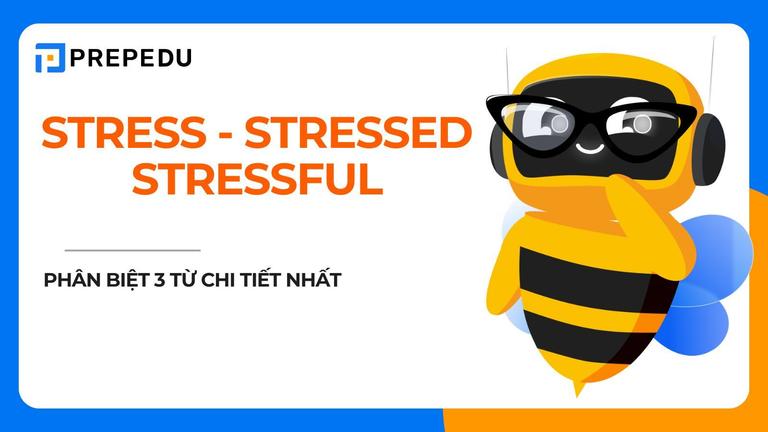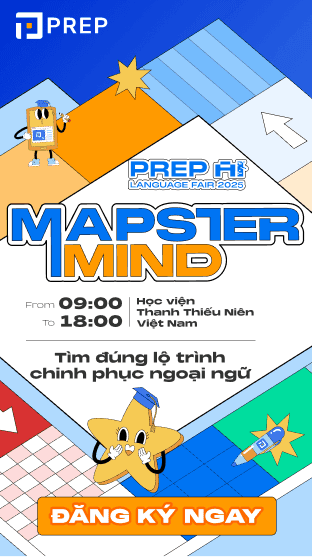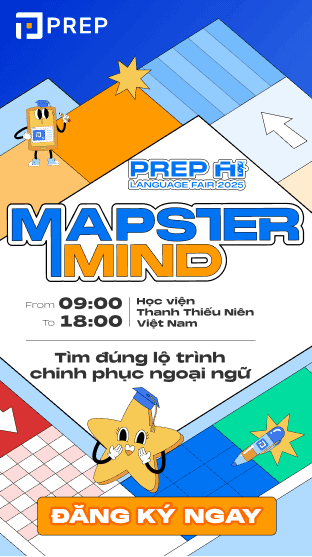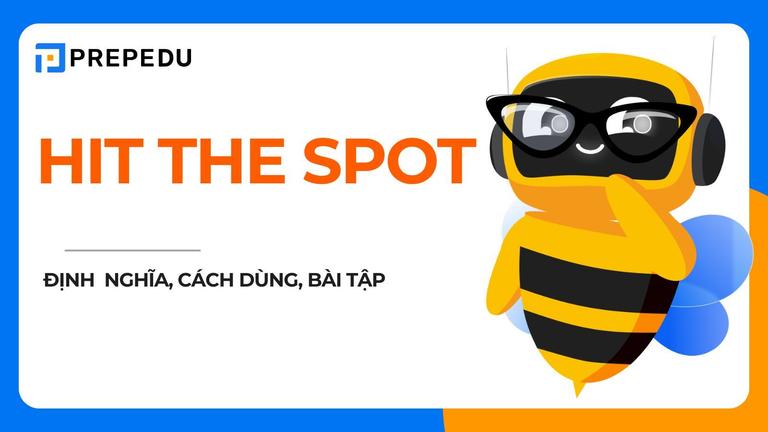Đề bài và đáp án bài đọc Cambridge IELTS 13 Test 1 Reading Passage 1 Why being bored is stimulating
Bài đọc IELTS Reading Passage 2 Why Being Bored Is Stimulating nằm trong bộ Cambridge IELTS 13, xoay quanh một chủ đề tưởng chừng quen thuộc nhưng đầy thú vị: sự buồn chán (boredom) và vai trò tích cực của nó trong tư duy sáng tạo. Dưới đây là đề bài, đáp án chi tiết, giải thích từng câu hỏi và từ vựng quan trọng giúp bạn nắm chắc nội dung và cải thiện kỹ năng làm bài hiệu quả hơn. Cùng tham khảo nhé!
- I. Bài đọc reading cam 13 test 1 passage 2 Why being bored is stimulating
- II. Đáp án Bài đọc reading cam 13 test 1 passage 2 Why being bored is stimulating
- III. Giải thích đáp án chi tiết IELTS Cambridge 13 Reading Passage 1 why being bored is stimulating and useful too
- IV. Từ vựng hay trong bài gần ghi nhớ
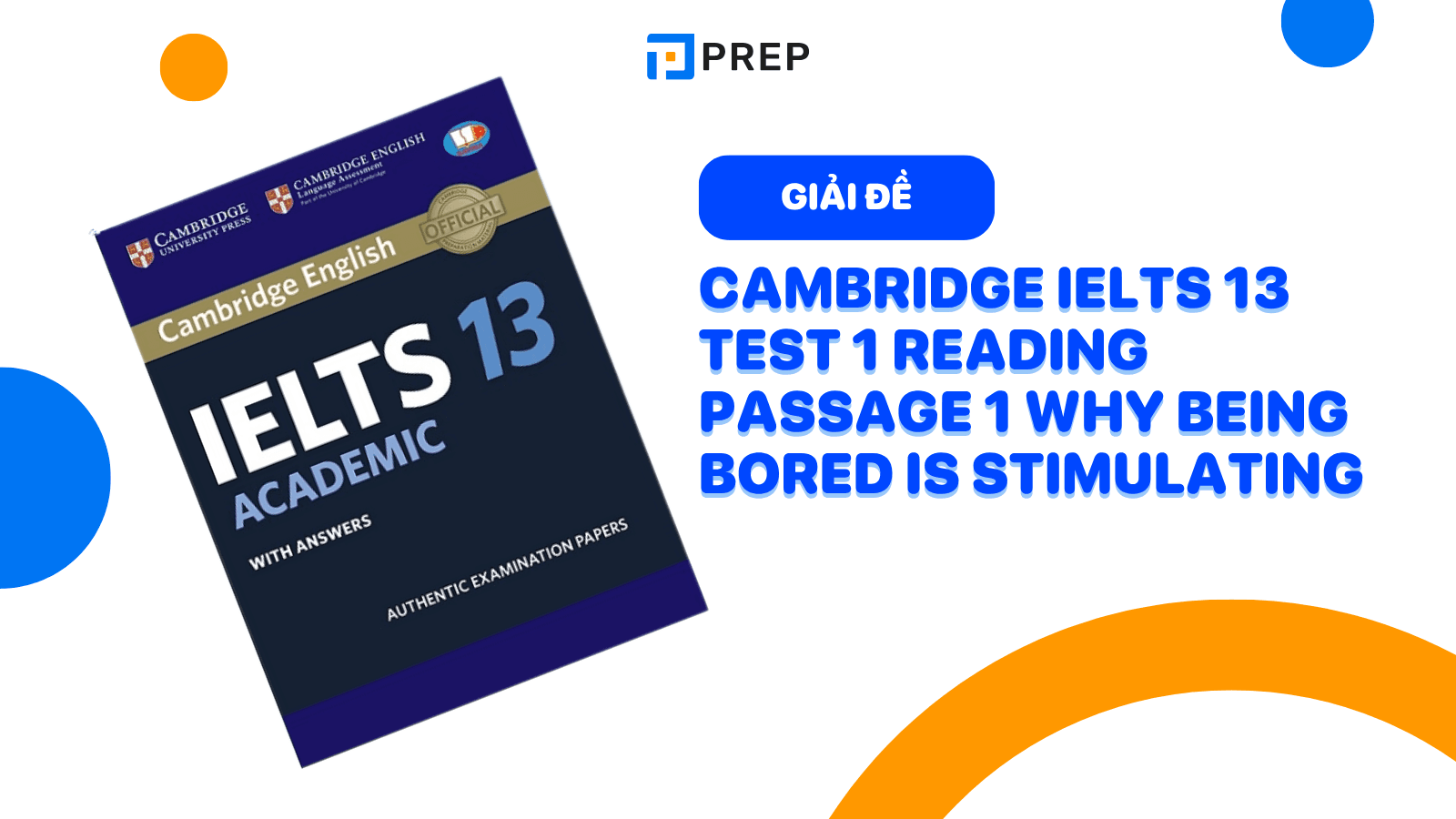
I. Bài đọc reading cam 13 test 1 passage 2 Why being bored is stimulating
Bài đọc IELTS Reading Passage 2 – Why Being Bored Is Stimulating:
Paragraph A
We all know how it feels – it’s impossible to keep your mind on anything, time stretches out, and all the things you could do seem equally unlikely to make you feel better. But defining boredom so that it can be studied in the lab has proved difficult. For a start, it can include a lot of other mental states, such as frustration, apathy, depression and indifference. There isn’t even agreement over whether boredom is always a low-energy, flat kind of emotion or whether feeling agitated and restless counts as boredom, too. In his book, Boredom: A Lively History, Peter Toohey, at the University of Calgary, Canada, compares it to disgust – an emotion that motivates us to stay away from certain situations. ‘If disgust protects humans from infection, boredom may protect them from “infectious” social situations,’ he suggests.
Paragraph B
By asking people about their experiences of boredom, Thomas Goetz and his team at the University of Konstanz in Germany have recently identified five distinct types: indifferent, calibrating, searching, reactant and apathetic. These can be plotted on two axes – one running left to right, which measures low to high arousal, and the other from top to bottom, which measures how positive or negative the feeling is. Intriguingly, Goetz has found that while people experience all kinds of boredom, they tend to specialise in one. Of the five types, the most damaging is ‘reactant’ boredom, with its explosive combination of high arousal and negative emotion. The most useful is what Goetz calls ‘indifferent’ boredom: someone isn’t engaged in anything satisfying but still feels relaxed and calm. However, it remains to be seen whether there are any character traits that predict the kind of boredom each of us might be prone to.
Paragraph C
Psychologist Sandi Mann at the University of Central Lancashire, UK, goes further. ‘All emotions are there for a reason, including boredom,’ she says. Mann has found that being bored makes us more creative. ‘We’re all afraid of being bored, but in actual fact, it can lead to all kinds of amazing things,’ she says. In experiments published last year, Mann found that people who had been made to feel bored by copying numbers out of the phone book for 15 minutes came up with more creative ideas about how to use a polystyrene cup than a control group. Mann concluded that a passive, boring activity is best for creativity because it allows the mind to wander. In fact, she goes so far as to suggest that we should seek out more boredom in our lives.
Paragraph D
Psychologist John Eastwood at York University in Toronto, Canada, isn’t convinced. ‘If you are in a state of mind-wandering, you are not bored,’ he says. ‘In my view, by definition, boredom is an undesirable state.’ That doesn’t necessarily mean that it isn’t adaptive, he adds. ‘Pain is adaptive – if we didn’t have physical pain, bad things would happen to us. Does that mean that we should actively cause pain? No. But even if boredom has evolved to help us survive, it can still be toxic if allowed to fester.’ For Eastwood, the central feature of boredom is a failure to put our ‘attention system’ into gear. This causes an inability to focus on anything, which makes time seem to go painfully slowly. What’s more, your efforts to improve the situation can end up making you feel worse. ‘People try to connect with the world, and if they are not successful, they experience frustration and irritability,’ he says. Perhaps most worryingly, says Eastwood, repeatedly failing to engage attention can lead to a state where we don’t know what to do any more and no longer care.
Paragraph E
Eastwood’s team is now trying to explore why the attention system fails. It’s early days but they think that at least some of it comes down to personality. Boredom proneness has been linked with a variety of traits. People who are motivated by pleasure seem to suffer particularly badly. Other personality traits, such as curiosity, are associated with a high boredom threshold. More evidence that boredom has detrimental effects comes from studies of people who are more or less prone to boredom. It seems those who bore easily face poorer prospects in education, their career and even life in general. But of course, boredom itself cannot kill – it’s the things we do to deal with it that may put us in danger. What can we do to alleviate it before it comes to that? Goetz’s group has one suggestion. Working with teenagers, they found that those who ‘approach’ a boring situation – in other words, see that it’s boring and get stuck in any way – report less boredom than those who try to avoid it by using snacks, TV or social media for distraction.
Paragraph F
Psychologist Francoise Wemelsfelder speculates that our over-connected lifestyles might even be a new source of boredom. ‘In modern human society, there is a lot of overstimulation but still many problems finding meaning,’ she says. So, instead of seeking yet more mental stimulation, perhaps we should leave our phones alone and use boredom to motivate us to engage with the world in a more meaningful way.
Questions 14 – 19
Reading Passage 2 has six paragraphs, A-F
Choose the correct heading for each paragraph from the list of headings below.
Write the correct number, i-viii, in boxes 14-19 on your answer sheet.
List of Headings
i The productive outcomes that may result from boredom
ii What teachers can do to prevent boredom
iii A new explanation and a new cure for boredom
iv Problems with a scientific approach to boredom
v A potential danger arising from boredom
vi Creating a system of classification for feelings of boredom
vii Age groups most affected by boredom
viii Identifying those most affected by boredom
-
Paragraph A
-
Paragraph B
-
Paragraph C
-
Paragraph D
-
Paragraph E
-
Paragraph F
Questions 20 – 23
Look at the following people (Questions 20-23) and the list of ideas below.
Match each person with the correct idea, A-E.
Write the correct letter, A-E, in boxes 20-23 on your answer sheet.
List of Ideas
A. The way we live today may encourage boredom.
B. One sort of boredom is worse than all the others.
C. Levels of boredom may fall in the future.
D. Trying to cope with boredom can increase its negative effects.
E. Boredom may encourage us to avoid an unpleasant experience.
-
Peter Toohey
-
Thomas Goetz
-
John Eastwood
-
Francoise Wheels Felder
Questions 24-26
Complete the summary below.
Choose ONE WORD ONLY from the passage for each answer.
Write your answers in boxes 24-26 on your answer sheet.
Responses To Boredom
For John Eastwood, the central feature of boredom is that people cannot 24_______ , due to a failure in what he calls the ‘attention system’, and as a result, they become frustrated and irritable. His team suggests that those for whom 25____________ is an important aim in life may have problems in coping with boredom, whereas those who have the characteristic of 26___________ can generally cope with it.
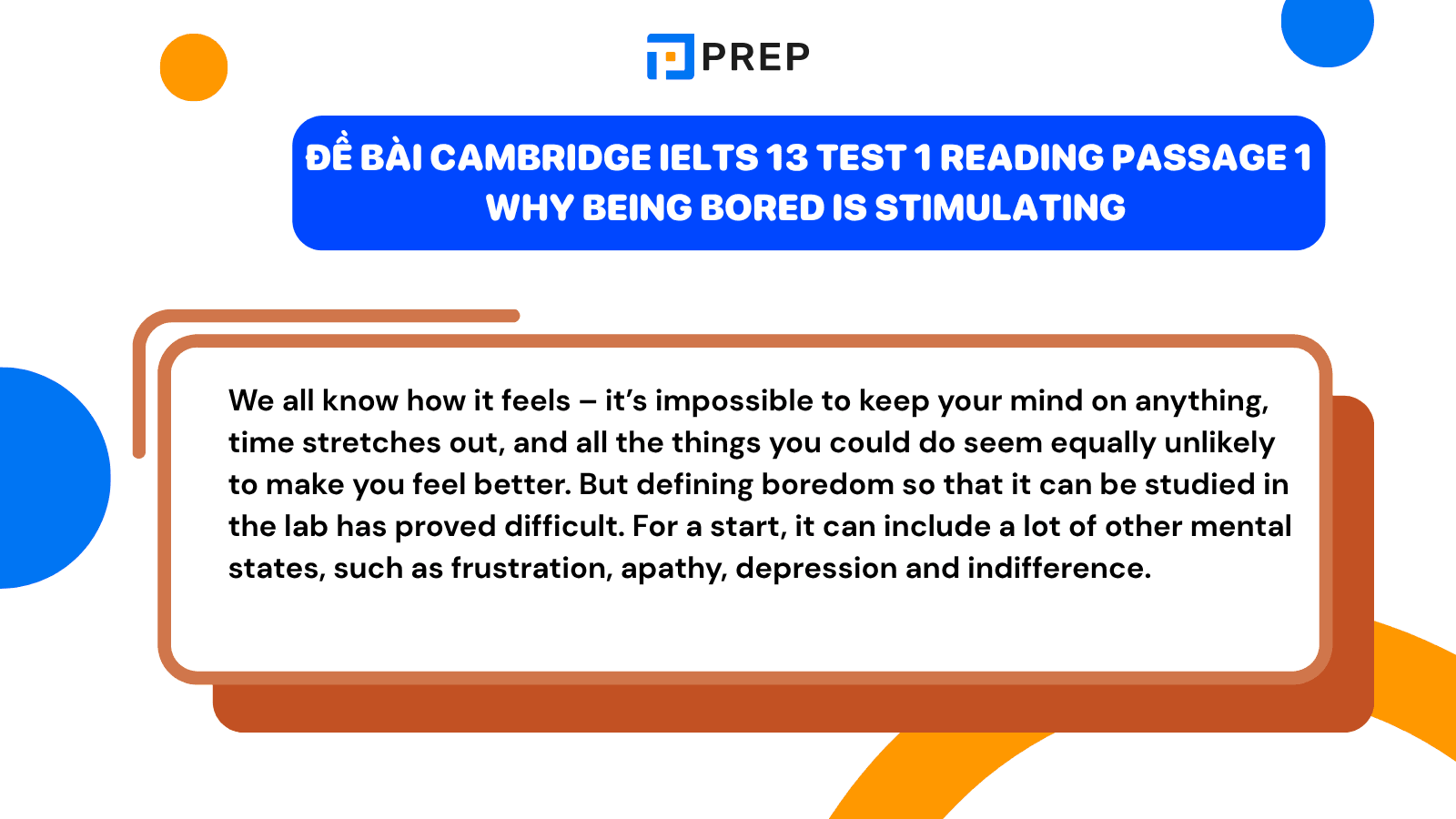
II. Đáp án Bài đọc reading cam 13 test 1 passage 2 Why being bored is stimulating
|
Questions |
Answers |
|
14 |
iv |
|
15 |
vi |
|
16 |
i |
|
17 |
v |
|
18 |
viii |
|
19 |
iii |
|
20 |
E |
|
21 |
B |
|
22 |
D |
|
23 |
A |
|
24 |
focus |
|
25 |
pleasure |
|
26 |
curiosity |
III. Giải thích đáp án chi tiết IELTS Cambridge 13 Reading Passage 1 why being bored is stimulating and useful too
Dưới đây là phần giải thích chi tiết đáp án bài đọc Passage 1 Cambridge IELTS 13 why being bored is stimulating and useful too.
|
Câu hỏi |
Đáp án |
|
14. iv (Problems with a scientific approach to boredom) |
Đoạn A nói về việc khó định nghĩa boredom một cách khoa học vì nó chứa nhiều trạng thái khác nhau (frustration, apathy, indifference…). Tác giả cũng nhấn mạnh chưa có sự đồng thuận về bản chất của boredom → “problems with a scientific approach”. |
|
15. vi (Creating a system of classification for feelings of boredom) |
Đoạn B mô tả Thomas Goetz và nhóm của ông phân loại boredom thành 5 loại khác nhau và vẽ ra hai trục đánh giá. Đây chính là “a system of classification” cho các dạng cảm xúc buồn chán. |
|
16. i (The productive outcomes that may result from boredom) |
Đoạn C nói rằng Sandi Mann phát hiện sự buồn chán có thể làm con người sáng tạo hơn, và thậm chí khuyên nên “seek out more boredom”. → Boredom có thể dẫn tới kết quả tích cực, “productive outcomes”. |
|
17. v (A potential danger arising from boredom) |
Đoạn D (John Eastwood) nói rằng boredom là một trạng thái không mong muốn và có thể “toxic if allowed to fester” – nếu để lâu có thể gây hại, khiến con người mất khả năng tập trung và trở nên thờ ơ, rất nguy hiểm. |
|
18. viii (Identifying those most affected by boredom) |
Đoạn E nói về việc nhóm của Eastwood đang nghiên cứu những đặc điểm tính cách khiến người ta dễ chán hơn – như “motivated by pleasure” hay “curiosity”. → “Identifying those most affected”. |
|
19. iii (A new explanation and a new cure for boredom) |
Đoạn F giới thiệu Francoise Wemelsfelder, cho rằng cuộc sống hiện đại quá kích thích lại khiến ta thiếu ý nghĩa, và khuyên nên “use boredom to motivate us to engage meaningfully” → đây là một cách hiểu và giải pháp mới cho boredom. |
|
20. E (Peter Toohey) |
Đoạn A: Toohey so sánh boredom với disgust, giúp con người tránh khỏi những tình huống tiêu cực, tức là boredom “encourages us to avoid unpleasant experiences”. |
|
21. B (Thomas Goetz) |
Đoạn B: Goetz nhận thấy có 5 loại boredom, trong đó “reactant boredom” là tồi tệ nhất (the most damaging). → Một loại tệ nhất trong số các loại → “one sort is worse than all the others”. |
|
22. D (John Eastwood) |
Đoạn D: Eastwood cho rằng việc cố gắng thoát khỏi boredom có thể khiến mọi thứ tệ hơn: “your efforts to improve the situation can end up making you feel worse” → trying to cope with boredom can increase its negative effects. |
|
23. A (Francoise Wemelsfelder) |
Đoạn F: Bà nói cuộc sống hiện đại quá kích thích (over-connected lifestyles) lại khiến con người cảm thấy trống rỗng → “the way we live today may encourage boredom.” |
|
24. focus |
Đoạn D: “a failure to put our attention system into gear” → tức là không thể tập trung (focus) vào điều gì. |
|
25. pleasure |
Đoạn E: “People who are motivated by pleasure seem to suffer particularly badly.” → Những người hướng đến khoái cảm dễ chán hơn. |
|
26. curiosity |
Đoạn E: “Traits such as curiosity are associated with a high boredom threshold.” → Những người có tính tò mò chịu đựng boredom tốt hơn. |
Xem thêm: Đề bài và đáp án bài đọc IELTS Cambridge 13 Reading Passage 1 Tourism New Zealand website
IV. Từ vựng hay trong bài gần ghi nhớ
Một số từ vựng hay trong bài đọc why being bored is stimulating and useful too các bạn nên lưu ý:
|
Từ / Cụm từ |
Nghĩa tiếng Việt |
Ví dụ minh họa |
|
boredom proneness |
xu hướng dễ cảm thấy chán |
People with high boredom proneness often struggle to stay focused. (Những người dễ chán thường khó duy trì sự tập trung.) |
|
apathy / indifferent |
sự thờ ơ, lãnh đạm |
His apathy towards school led to poor grades. (Sự thờ ơ với việc học khiến anh ấy bị điểm kém.) |
|
arousal |
sự kích thích (tinh thần hoặc cảm xúc) |
High arousal boredom involves restlessness and frustration. (Boredom mức kích thích cao khiến con người bồn chồn và cáu kỉnh.) |
|
mind-wandering |
tâm trí lang thang / mơ màng |
Mind-wandering can sometimes lead to creative insights. (Tâm trí mơ màng đôi khi giúp nảy ra ý tưởng sáng tạo.) |
|
adaptive |
có tính thích nghi |
Pain is an adaptive response that protects us. (Cơn đau là phản ứng thích nghi giúp bảo vệ cơ thể.) |
|
toxic (adj.) |
có hại, tiêu cực |
Boredom can be toxic if we let it fester. (Sự buồn chán có thể trở nên độc hại nếu để kéo dài.) |
|
threshold |
ngưỡng (giới hạn chịu đựng) |
People with a high boredom threshold rarely get restless. (Người có ngưỡng chịu đựng boredom cao hiếm khi bồn chồn.) |
|
overstimulation |
sự kích thích quá mức |
Overstimulation from technology can make us feel empty. (Việc bị kích thích quá mức từ công nghệ có thể khiến ta thấy trống rỗng.) |
|
engage with |
gắn kết với, tham gia vào |
We should engage with the world in a more meaningful way. (Chúng ta nên gắn kết với thế giới theo cách có ý nghĩa hơn.) |
|
detrimental (adj.) |
gây hại, bất lợi |
Boredom has detrimental effects on learning. (Sự buồn chán có tác động tiêu cực đến việc học tập.) |
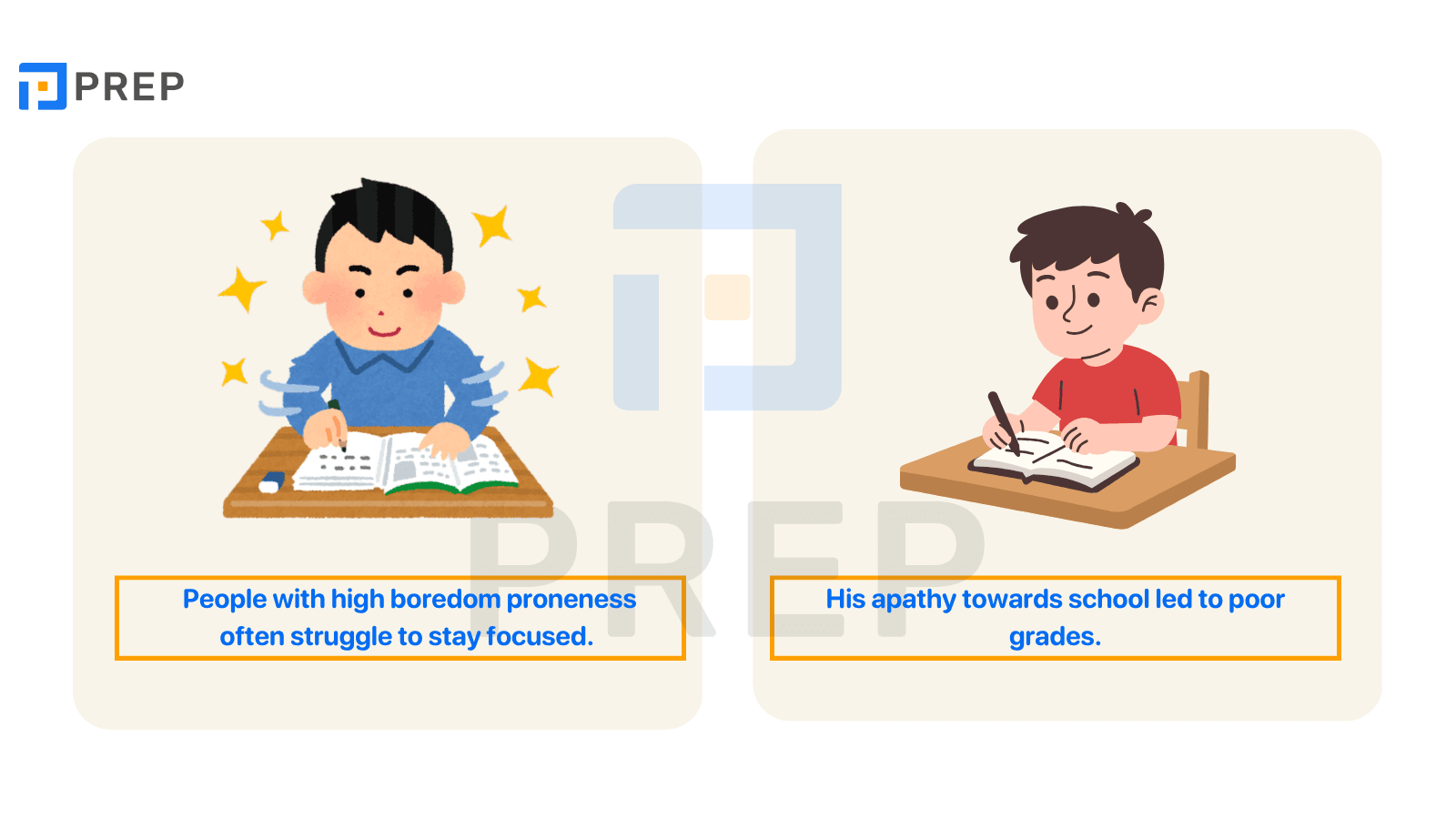
Trên đây là đề bài và đáp án chi tiết bài đọc Cambridge IELTS 13 Test 1 Passage why being bored is stimulating and useful too. Hy vọng bài tài liệu trên sẽ giúp các bạn ôn luyện thi IELTS hiệu quả, đạt được band điểm cao như mong đợi.
Học tiếng Anh online dễ dàng hơn với PREP - Nền tảng Học & Luyện thi thông minh cùng AI. Nhờ công nghệ AI độc quyền, bạn có thể tự học trực tuyến ngay tại nhà, chinh phục lộ trình học IELTS, TOEIC, tiếng Anh giao tiếp hiệu quả. Bên cạnh đó, học viên còn có sự hỗ trợ tuyệt vời từ Teacher Bee AI, trợ lý ảo giúp bạn giải đáp thắc mắc và đồng hành 1-1 trong suốt quá trình học tập.
Hãy click TẠI ĐÂY hoặc liên hệ HOTLINE 0931428899 để nhận tư vấn chi tiết về các khóa học tiếng Anh chất lượng nhất thị trường!
Tải ngay app PREP để bắt đầu hành trình học tiếng Anh tại nhà với chương trình học luyện thi online chất lượng cao.

Chào bạn! Mình là Hiền Hoàng, hiện đang đảm nhận vai trò quản trị nội dung sản phẩm tại Blog của website prepedu.com.
Với hơn 5 năm tự học các ngoại ngữ như tiếng Anh, tiếng Trung và ôn luyện một số kỳ thi IELTS, TOEIC, HSK, mình đã tự đúc rút được nhiều kinh nghiệm để hỗ trợ hàng nghìn người đang gặp khó khăn trong việc học ngoại ngữ. Hy vọng rằng những chia sẻ phía trên sẽ giúp ích cho bạn trong quá trình tự ôn luyện thi hiệu quả tại nhà!
Bình luận
Nội dung premium
Xem tất cảLộ trình cá nhân hoá
Có thể bạn quan tâm
Kết nối với Prep

MSDN: 0109817671.
Địa chỉ liên hệ: Tòa nhà Vinaconex, 34 Láng Hạ, phường Láng, TP Hà Nội.
Trung tâm CSKH tại HN: Lô 21 C2 Khu đô thị Nam Trung Yên, phường Yên Hòa, TP Hà Nội.
Trung tâm CSKH tại HCM: 288 Pasteur, Phường Xuân Hòa, TP Hồ Chí Minh
Trụ sở Công ty: Số nhà 20, ngách 234/35 đường Hoàng Quốc Việt, phường Nghĩa Đô, TP Hà Nội.
Phòng luyện ảo - Trải nghiệm thực tế - Công nghệ hàng đầu.
Hotline: 0931 42 8899.
Trụ sở Công ty: Số nhà 20, ngách 234/35 đường Hoàng Quốc Việt, phường Nghĩa Đô, TP Hà Nội.
Giấy chứng nhận hoạt động đào tạo, bồi dưỡng số 1309/QĐ-SGDĐT ngày 31 tháng 07 năm 2023 do Sở Giáo dục và Đào tạo Hà Nội cấp.




